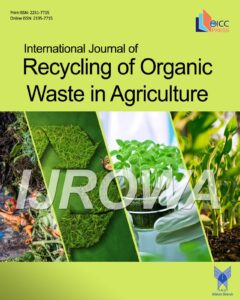
Background Recycling of crop residues is essential to sustain soil fertility and crop production. Therefore, it is of crucial importance to study the decomposition of crop residues particularly in the arid tropics. The decomposition and nutrient release pattern from crop residues incorporated in the soil have rarely been investigated under semiarid climatic conditions in Sudan. […]
Background The disposal of sugar mill effluent has become a major problem in India due to generation of huge volume of effluent. The value of wastewater for crop production has been recognized in many countries, including India. The effluents not only contain nutrients that stimulate growth of many crops, but also may have various toxic […]
Background Evaluation of urban sewage for its feasibility and potentiality as sources of irrigation water and plant nutrient is need of the hour. In this context, a field experiment was laid out in split–split plot design with three replications. Main plots constituted two types of lands (fields irrigated with sewage and bore well water since […]
There is a widespread interest in converting organic waste into compost fertilizer to extend the life of landfills, create economic and environmental benefits, and ultimately reduce the pressure on local governments in managing the ever-increasing complexity of municipal solid waste. However, composting is still seldom considered as a strategic element. There is also very little […]
Introduction The Lusaka Water and Sewerage Company (LWSC) produces *800–1,000 kg of treated sewage sludge per day at its Manchinchi wastewater treatment plant (WWTP). The biosolids are used for land application purposes although the contaminant and pathogen composition and quality of the biosolids have been unknown until this study. Zambia does not have legal standards […]
Background Animal and municipal solid wastes (MSW) create environmental pollution. It is one of the most challenging problems which require attention. Efforts were made for the conversion and eco-management of animal and municipal wastes into safe and hygienic products by an epigeic earthworm Eisenia fetida. The excess use of chemical fertilizer and synthetic pesticide has […]
Background This experiment was conducted to study the effect of diet contained mushroom spent wheat straw (MSWS) remained from Agaricus bisporus mushroom as well as the physical form of the diet on the performance of the feedlot calves. At the end of mushroom harvesting period, MSWS was collected from production room and the casing soil […]
Introduction Vermicomposting could increase nutrients availability including phosphorus. During vermicomposting, a decomposition of organic substrates leads to the production of several organic acids, such as malonic, fumaric, succinic acids. Microorganisms both in the intestinal organ of the worms and the organic waste have the ability to convert insoluble P into soluble forms. Little information exists […]
Background Restaurant waste (RW) can be considered as a valuable feedstuff for animal nutrition due to its high nutritional value and low price. The aim of this study was to determine nutritional value and the microbial load of the waste in order to incorporate it in the poultry feedstuff. To our knowledge the current study […]
Background Water hyacinth (Eichhorniacrassipes) is one of the most uncompromising weeds in the whole world. Its adverse effects due to fast growth rate are main physical interference with fishing and navigation. Water hyacinth also causes eutrophication due to the large release of organic nutrients after its degradation, consequentially deterioration of water quality and also adversely […]